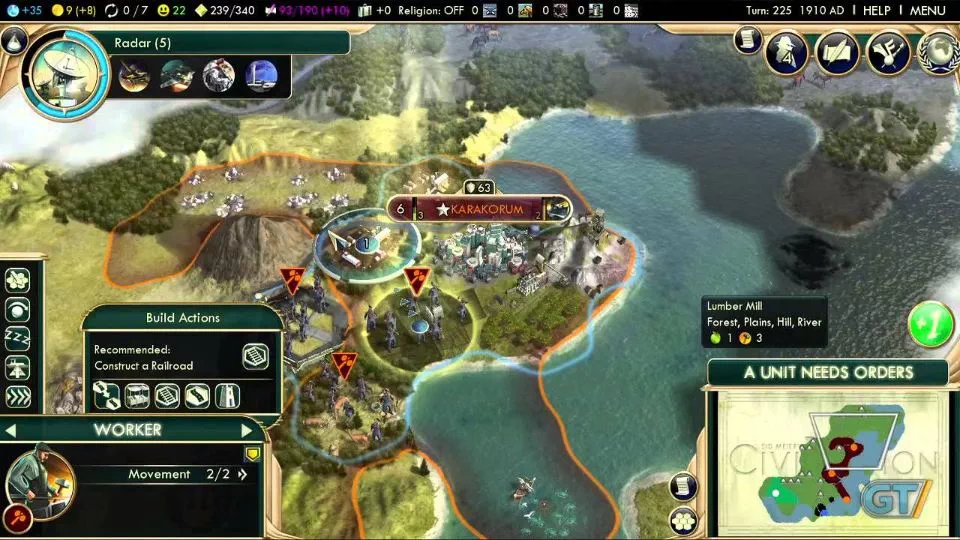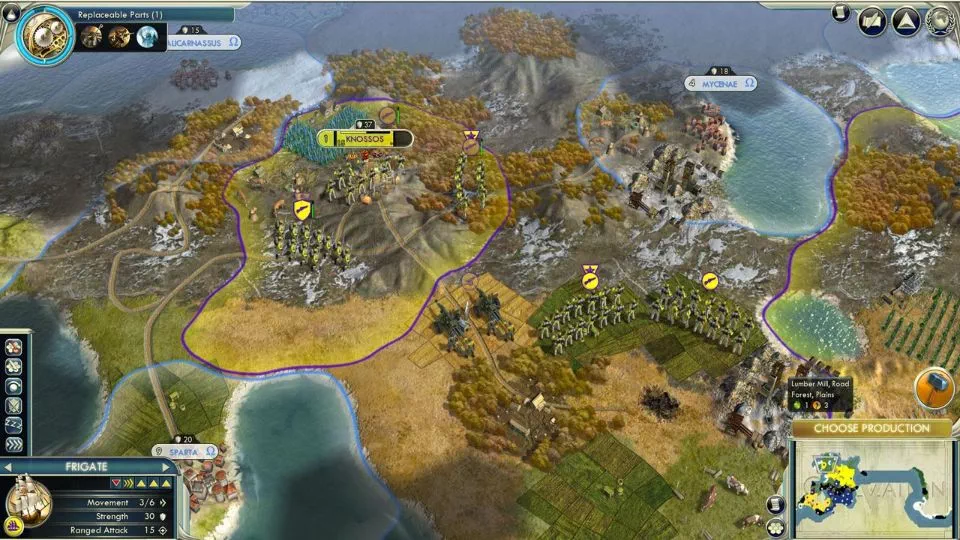Warcraft III Reforged - Gam...
Every single die-hard gamer got super excited...
By Reanna Quitzon2113

0

Sid Meier's Civilization V is a turn-based, unit-based, 4X strategy game that remains to this day the best game in its franchise. Although Civilization VI came out a couple of years later and took a lot of Civ V’s spotlight, it’s still incredibly popular, and I have no qualms whatsoever at mentioning that it’s the game that I’ve logged the most hours on through the Steam launcher.
It’s a full 10/10 in the Steam store, and its reviews remain “overwhelmingly positive”. It originally came out in 2010 and was followed up by the two expansion packs, Gods & Kings and Brave New World, both of which vastly improved the game and pretty much made it what it is today.
I bought the game with both downloadable contents (DLCs), but I have also tried playing it without them. Answer: don’t. But, regardless of the effect produced by DLCs, Civ is a great game, for a wide variety of reasons.
To begin with, Civ is primarily a strategy game. You play as the ruler of civilization and you expand it from scratch by controlling movable units that can explore the map, creating cities or fighting other civilizations.
It’s pretty standard compared to other strategy games, but the main difference is that Civ is turn-based, meaning you don’t control the real-time activity of the individuals in your army. Thus, you don’t get to visit each city of yours and plan it out block-by-block.
What you do get to do is explore the map as fast as you can before any of the other civilizations can get the ancient ruins full of goodies, while at the same time grinding to expand your empire as fast as you can (or playing “tall” strategy, whichever you like).
The game has eight difficulties, ranging from the amateur level “Settler” to the god-like, unbeatable “Deity” level. Players can also choose to vary the time-scale of the game, ranging from a “Quick” game, which might end in an hour or two, to a “Marathon” that might take around twelve hours or so.
The game’s map is randomized, with different templates to select from, and the number of civilizations to choose from can be around forty civilizations, with the DLCs installed, the majority of which are balanced and competitive to play with.
Every time you play anew a unique experience is created since each civilization comes with its own unique colors, banners, leaders, soundtrack, units, buildings, and even abilities that change the way the game progresses.
 https://revyou.com/uploads/thumbnail-960/1591477132677maxresdefault.webp
Sid Meier's Civilization V - Review
https://revyou.com/uploads/thumbnail-960/1591477132677maxresdefault.webp
Sid Meier's Civilization V - Review https://revyou.com/uploads/thumbnail-960/1591477132680p1_2427009_50f1a6b0.webp
Sid Meier's Civilization V - Review
https://revyou.com/uploads/thumbnail-960/1591477132680p1_2427009_50f1a6b0.webp
Sid Meier's Civilization V - Review
As you can see, it is very easy for any type of player to enjoy Civ, due to the large variety and choices made open to the player at the beginning of the game. Casual players or beginners just getting to know the game will have a lot of fun, competing with the various AI civilizations on the “Prince” difficulty level and the “Quick” speed, if they’re a bit tired of waiting around for different tasks to be completed.
While those trying to up their game might incrementally increase their difficulties (getting stuck at “Deity” because it’s insanely difficult to win at). Civ also has multiplayer modes, where you can play online on your own local network, or even on a single device, switching users in the same turn so that multiple people can play in a single save file.
To be honest, I never got into playing the multiplayer, because, of the fact that, you have to wait for other humans to finish their turns (and this can get boring). However, the single-player mode was more than enough for me to enjoy the gameplay completely.
Speaking of which, the gameplay is generally pretty enjoyable, with the only exception being, the slow horror of being surrounded and conspired against by all the AI civilizations with your own cities slowly being conquered and taken before your eyes as your resources and capabilities decay into dust.
But, seriously, the main gameplay issue would likely be familiarity with the game concepts for completely fresh players. The menus are really intimidating and, in retrospect, quite similar to starting a large fantasy boardgame for the first time.
New players will, more likely than not, have to play a couple of games, before they’re comfortable enough with all the different aspects of the game to confidently play through a higher difficulty mode.
There’s no real way around this issue and, although the game has a pretty lengthy collection of voice-acted tutorial messages that appear for new players, it all comes down to learning from the raw experience of playing.
The content of the game is a different story. You can’t really call Civ realistic, because of the fact that its map is randomized, making civilizations interact in an unreal world and in impossible situations; an example would be the US learning “Archery” and declaring war on ancient Egypt.
However, the game’s content is completely derived from real-life sources, with players building wonders (not just the Seven Wonder of the Ancient World) in their cities, artworks and music pieces being produced when players encounter a Great Artist or Musician, and a relatively realistic technology progression throughout the length of the game.
Players, unless they change the default setting, start in the ancient era with their civilization having just learned to farm and have to perform research to unlock new units, abilities, and technologies, progressing from the ancient era, through classical and medieval eras, to the atomic era and beyond.
It’s incredibly rewarding to explore the different wonders and units as well as their different abilities, as you play the game over and over again. I will note that in the few moments where I tried to play Civ without the DLCs, the game, while still the same core game, was lacking a lot of major components, so I would recommend that players stick to playing with the DLC enabled as much as possible.
Besides the core gameplay and the multiplayer option, the game also provides “scenarios”. These scenarios are different preset games with unique civilizations that are often designed to replicate real-life historical events. Players can choose to take control of the ancient Chinese kingdoms as they try to fend off increasing Mongol attacks, or witness the fall of Rome at the hands of the northern European nomads.
Sid Meier’s Civilization V is pretty much a masterpiece. It’s difficult to pinpoint any one place that could require severe improvement, and the gameplay holds up extremely well in comparison to modern strategy games. It fills its niche really well, and players are more than satisfied with it, and rightly so.
Updated 4 years ago